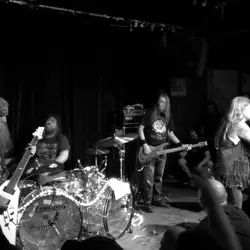 Saint Vitus
Saint VitusSaint Vitus predate Metallica and Slayer. Their 1978 formation falls only three years shy of Iron Maiden's original line-up. Believe it or not, Vitus would prove equally influential as their lauded contemporaries. Except, where their peers would go on to fame and fortune, Saint Vitus would remain a cult act for almost their entire initial career – fizzling out in relative ignominy in 1995.
“When that happened, we were absolutely certain that we would never get back together. We were quite positive about not doing it ever again,” guitarist and founding member Dave Chandler says. “Because that 1995 album, Die Healing, was supposed to be the very last thing by Saint Vitus. The band was very much planned to end after that record came out. So, we had no ambitions beyond that.”
Saint Vitus helped pioneer doom metal. A variant of heavy metal indebted to Black Sabbath's initial turgid blueprint, doom metal stands in direct opposition to heavy metal's more celebrated obsessions with speed and technicality – opting for gruelingly slow tempos and crushingly low tunings. In the late-'70s, Saint Vitus, in particular, found their sound in stark contrast to rising trends like thrash metal and the NWOBHM.
Perhaps as a result, they were never as commercially or critically acclaimed as their contemporaries. Yet, the sound they helped pioneer has gone on to become a true touchstone for bands across the entire spectrum of heavy metal. The murky rumblings of doom can be heard in the work of modern iconoclasts like Mastodon and Neurosis. As such, their 2008 reformation was greeted quite differently to their 1995 disbandment.
Don't miss a beat with our FREE daily newsletter
“Yeah, we never thought about that whole doom metal thing. When we stopped in 1995, no one cared, so when we finally did get back together we were very pleasantly surprised. You know, after all this time,” Chandler laughs. “And then, all of a sudden, everyone starts talking about us as if we started something and citing us as an influence and we're just like – 'No, we never paid any attention to that, we just got out and played'.
“You know, 'What's going on?'” he laughs again. “So, it was a super-pleasant surprise for all of us. It's weird. It's definitely weird. We're taking it day by day. It gets easier the more you do it. But, yeah, it's definitely strange. It could all go away tomorrow. You could say that of any band. If we do another album and it sucks, we'll probably just disappear again. We don't intend to do that, though.”
Impressively, the band have managed to build on that momentum since their initial reunion tours. They're probably one of only a handful of bands to have delivered a post-reunion album that stands up with their best work. Released last year to considerable critical acclaim, Lillie: F-65 was said to capture the same classic vibes as their 1986 classic Born Too Late. Surprising, given Chandler had effectively hung up his guitar in the interim.
“We did our last live show in March of 1995 and I didn't take my guitar out of the case until I started with my next band Debris Inc. around 2000,” he says. “It was really strange because I was originally just asked to be a punk rock singer but the other guys claimed they didn't know how to play punk rock, so I said I'd show them, and that got me back into guitar. It was weird at first but, eventually, it was like riding a bike. It all came back.”















